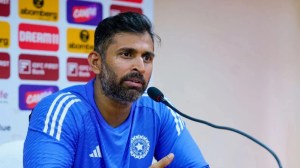Slow turn in Gujarat
Would you not lose your mental balance were you to discover you got it all wrong? 8220;Gandhian socialism8221; of early-eighties vintage w...

Would you not lose your mental balance were you to discover you got it all wrong? 8220;Gandhian socialism8221; of early-eighties vintage was what did in Atal Bihari Vajpayee last time round. Now it is the NDA agenda.
Imagine waiting in the wings since the Quit India movement only to put your own programme on the back-burner merely to get the opportunity to step centrestage! The whole idea of 8220;secular saffron8221; is such an oxymoron that only a moron could think it could last. Hence, from Goa on, it is gone-gone-gone.
The current Vajpayee dispensation may be but two and a half years old but the Vajpayee trick is now four years old. The trick was for the leader of the saffron brigade to wear the mukhauta, so that behind him could sneak in the stormers of the citadel. Jai Shri Ram! The Sangh Parivar has simply wearied of waiting for Vajpayee8217;s feint to deliver. Especially as Narendra Modi has shown the alternative to the Vajpayee road. A contemporary quotes 8220;a top BJP leader in Ahmedabad8221; as saying, 8220;People in Gujarat are now going to vote on a purely Hindu-Muslim basis.8221; Purely?
We have been here before. It was the driving out of millions of Hindu refugees from East Pakistan to West Bengal in 1949-50 which led Nehru8217;s minister of industry, Shyama Prasad Mookerjee, to resign from the Central government. He launched his Jan Sangh in October 1951, on the eve of the first general election, in the full conviction that as this was to be the first ever election in India on the basis of universal suffrage in an 85 per cent Hindu country, in a country moreover still traumatised by the horrors of Partition, the people would 8220;vote on a purely Hindu-Muslim basis8221;. In the event, the Jan Sangh got two seats 8212; and would never have come to power if V.P. Singh had not opened the doors to state governments for the BJP through his wholly unprincipled alliance with them in the assembly elections of February-March 1990.
The misperception was not Mookerjee8217;s alone. The misperception was so widely shared in the Congress that Congress Parliamentary Party sullenness over the Nehru-Liaquat pact of April 1950 led to Nehru tendering his resignation; to the election of Purushottam Das Tandon over Acharya Kriplani in the AICC session at Nasik in September 1950; and the stand-off between President Rajendra Prasad and the Nehru cabinet over what Nehru insisted would be the wholly un-secular act of the head of state of the secular Indian Union associating himself in any way with the inauguration of a temple, particularly the rebuilding of a temple at Somnath conceived as a retribution on history. Rajendra Prasad went 8212; but only as a private individual.
Nehru prevailed because he stood his ground on principle. That principle was stated at a Gandhi Jayanti meeting in the Ram Lila grounds at Delhi at the beginning of the very month in which the Jan Sangh was born. Nehru said 8212; and it is the ultimate creed for secular fundamentalists like myself: 8220;If any man raises his hand against another in the name of religion, I shall fight him till the last breath of my life, whether I am in government or outside.8221; Not only were the communal forces walloped at the hustings, secularism was so deeply ingrained into our body politic that the saffron challenge rose again only after three and a half decades 8212; in the mid-eighties.
Yet, just as there were those in the Congress in the early fifties who believed there was a soft Hindu alternative to the Hindutva of Golwalkar and gang, so are there secularists in the country in our times 8212; in the Congress and outside 8212; who think the answer to the saffron challenge lies not in hard secularism but in a soft Hindu alternative. Prominent among the non-Congress elements who till yesterday thought this a viable alternative are the now twitchy NDA partners, the chambers of commerce and industry who spotted the BJP as a soft touch, the Americans who were delighted at Jaswant Singh8217;s fawning and editorialists desperate for an alternative 8212; any alternative 8212; to the Congress.
Goa has sounded the wake-up call. We are back to where we were on the eve of the first general election. Is it to be secularism or Hindutva? It cannot be both 8212; as even the NDA partners are now learning. Gujarat will be the litmus test. Was the assault on the Sabarmati Ashram a law and order problem, or the storming of the Bastille of secularism? Is Gandhi still alive in the state of his birth? For if he is, then secularism is still alive in the country of his birth. If Gujarat goes the Modi way, secularism country-wide is in danger. But if Gujarat rejects Modi, the rejection will be as comprehensive 8212; and long-lasting 8212; as Nehru8217;s defeat of communalism in 1952.
Nehru won because he did not flinch. He refused 8212; adamantly 8212; to let considerations of votebank politics sway his resolve. Indeed, his intention, at the time he tendered his resignation in April 1950, was to spend the rest of his life on the East Bengal-West Bengal border bringing comfort and succour to the victims of a hate politics which then bore the name of Jinnah and now bears the name of Modi. Gandhi too, had he not been shot by the editor of a journal called Hindu Rashtra 8212; the life goal of Advani-Vajpayee-Modi-Shourie 8212; also intended to spend the rest of his days tending to the victims of Hindu communalism in Pakistan, thus bringing Pakistan back to the path of secularism.
It is for us secularist politicians to remember that there is a life for secularists beyond politics. Winning or losing in Gujarat is not the issue. Keeping aloft the banner of secularism, 8220;whether I am in government or outside8221;, as Nehru put it, is what secularism in politics is all about.
But I am convinced that in our India it is impossible for a secularist to be out of office for any period longer than an aberration. This country is secular because it is secular, not because someone has asked it to be. Bar a fringe of fanatics, the people of this country want to live in peace and harmony with each other. It is only faint-hearts who have lost their faith and parivarists who have lost their mental balance who could possibly imagine that after all it has gone through since February 27, Gujarat will vote saffron. Provided the alternative is articulated, provided there is no compromise of pure, unadulterated secularism, provided no non-Sanghi attempts to present a paler shade of saffron, provided the principled politics of Jawaharlal Nehru prevails, I am willing to bet my life on it that the forces of communalism will be crushed in the forthcoming election in Gandhi8217;s Gujarat. And I know I am putting my life on the line in saying so.
- 01
- 02
- 03
- 04
- 05































